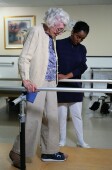- 8 Ways to Increase Dopamine Naturally
- 7 Best Breads for Maintaining Stable Blood Sugar
- Gelatin vs. Collagen: Which is Best for Skin, Nails, and Joints?
- The Long-Term Effects of Daily Turmeric Supplements on Liver Health
- Could Your Grocery Store Meat Be Causing Recurring UTIs?
- Are You Making This Expensive Thermostat Error This Winter?
- Recognizing the Signs of Hypothyroidism
- 10 Strategies to Overcome Insomnia
- Could Artificial Sweeteners Be Aging the Brain Faster?
- Techniques for Soothing Your Nervous System
After Hip Fracture, Home Exercise Program May Boost Recovery


A home exercise program provided added benefit to people recovering from a hip fracture, a new study reveals.
Specifically, hip fracture patients who’d completed a standard rehab program had better physical function if they continued with a home workout regimen that included exercises such as climbing steps or standing from a chair, found the study in the Feb. 19 issue of the Journal of the American Medical Association.
The study included 232 older hip fracture patients who’d finished standard rehab and were divided into two groups. One group did a home exercise program taught to them by a physical therapist, while a comparison (“control”) group received in-home or telephone-based education about healthy eating.
After six months of follow-up, the patients in the home exercise group showed greater improvements in physical abilities and balance than those in the control group, the study authors noted in a journal news release.
“The traditional approach to rehabilitation for hip fracture leaves many patients with long-term functional limitations that could be reduced with extended rehabilitation. However, it is unlikely that additional months of highly supervised rehabilitation can be provided to patients with hip fracture,” wrote Nancy Latham, of Boston University, and colleagues.
The researchers noted that exercise programs can be challenging for people to perform on their own if they don’t know whether they’re doing the workouts properly and safely. The approach used in this study could help hip fracture patients continue to exercise in their own homes, the authors suggested.
However, further research is needed to assess if this program can be provided in a cost-effective way, they added.
More information
The U.S. Centers for Disease Control and Prevention has more about hip fractures.
Source: HealthDay
Copyright © 2026 HealthDay. All rights reserved.










